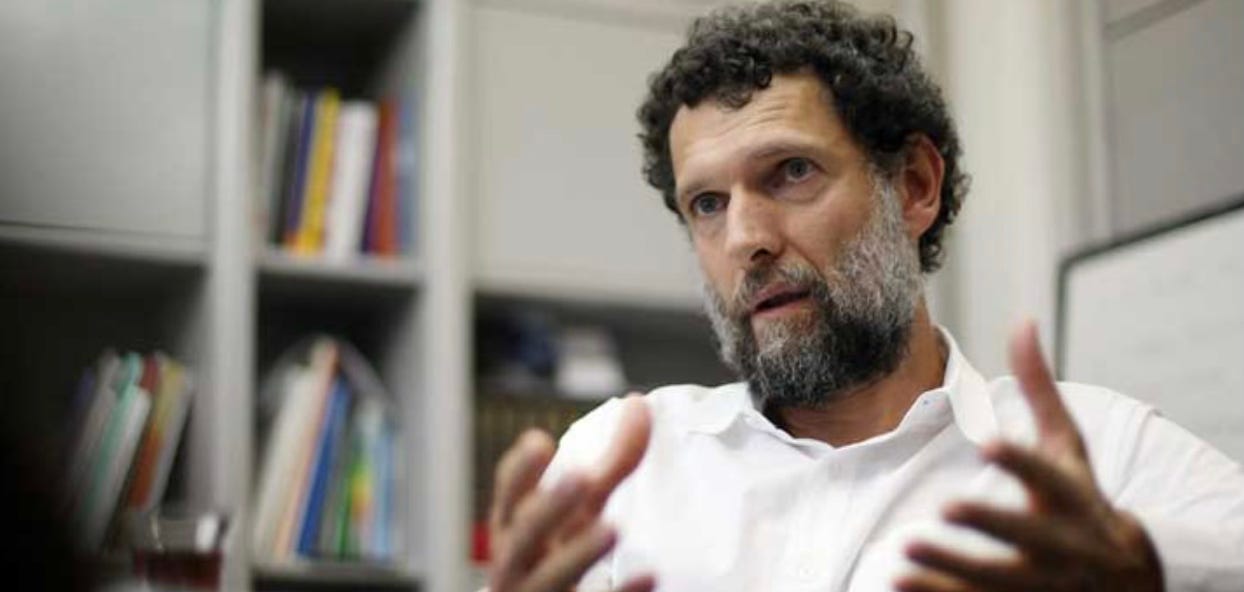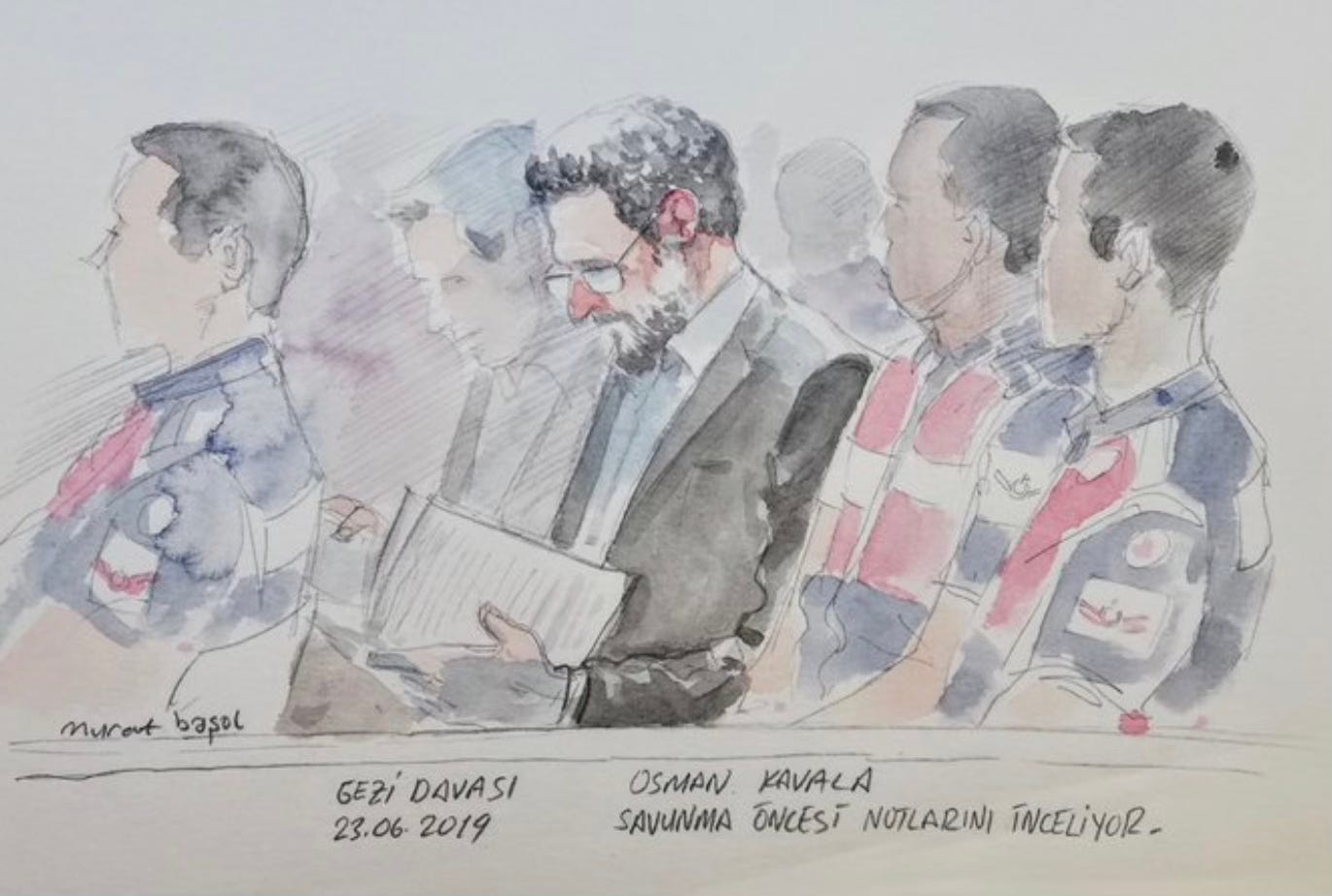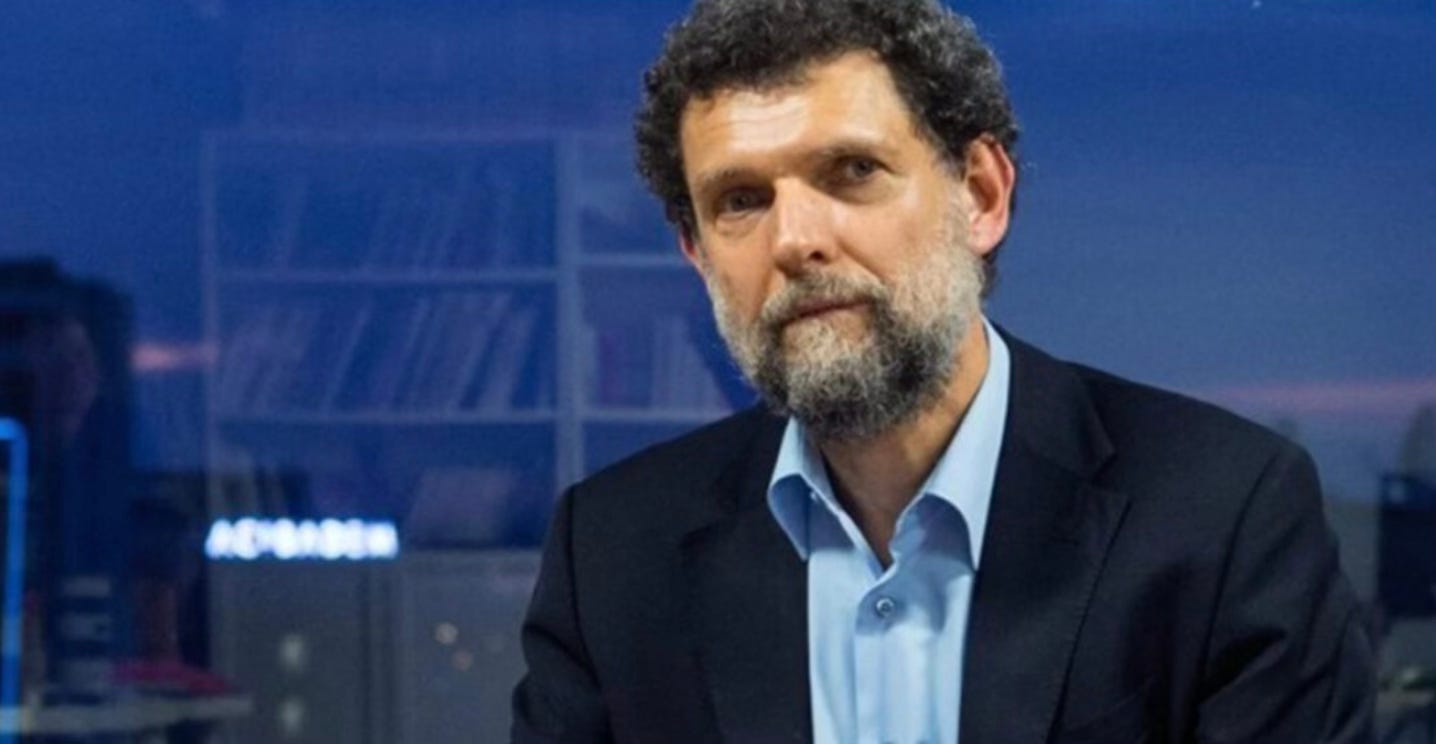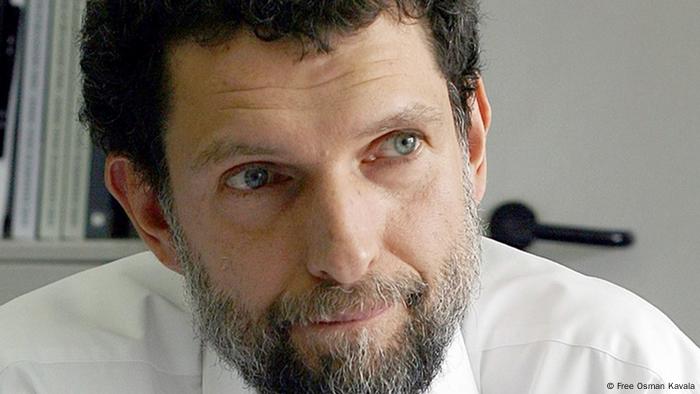His trial has been a sham from the start, flagrantly ignoring the rule of law and judgment from the highest European court.
It was on the late night hours of October 18, 2017 that I was delivered the news of the arrest. I was in Umbria, Italy, busy with going through a final proofread of my book, “Die Hoffnung Stirbt am Bosporus” (“The Hope Dies at Bosporus”), and had taken a break to relax, and mark my birthday in solitude at a small piazza in a remote village.
“Osman is arrested at the airport” was the message on my phone.
The entire night turned into a nightmare: I had known Osman Kavala for decades; had always his help for my work on monitoring media freedom and independence in Turkey, and professional dialogue with my colleagues from Armenia and Greece.
My hunch then was that the nightmare triggered by the arrest would be a turning point, to suffocate the efforts for a stronger civil society in Turkey, and the worst was to be expected. It has, sadly, proven to be true.
On October 18, 2025, Kavala will mark nine years behind bars — an enduring and stark symbol of political repression in Turkey.
Arrested solely for his associations with peaceful civic activism and cultural engagement, Kavala’s continued incarceration epitomizes the profound crisis in Turkey’s judicial independence, human rights, and democratic values.
His case transcends partisan lines, Turkish civil society, and defenders of the rule of law as the quintessential example of a political prisoner detained for nonpartisan, civilian causes.
The significance of Kavala’s detention extends far beyond his individual plight. He has become the foremost emblem of the growing number of political prisoners in Turkey — civilians, intellectuals, activists, and journalists silenced for expressing dissenting views or challenging the government’s monopoly on power. It should therefore continue to resonate deeply with international observers.

Kavala is a prominent civil society figure, entrepreneur, and philanthropist whose life’s work has focused on cultural dialogue, democratization, and human rights. As the founder of Anadolu Kültür, he has championed projects that promote peaceful coexistence and cultural understanding across Turkey’s diverse communities.
His efforts have spanned a broad spectrum, from supporting the arts and heritage preservation to empowering marginalized groups and encouraging constitutional reform. His commitment to open society principles aligns with universal democratic norms rather than any narrow political agenda.
In this context, Kavala embodies the spirit of a civil society actor genuinely invested in Turkey’s future as a pluralistic democracy. His role is not of an oppositional political figure or partisan operative, but that of a civic bridge-builder dedicated to fostering dialogue and inclusiveness.
It is this non-political yet deeply engaged identity that makes his imprisonment so telling—a blatant message to all civil society actors that independent organizing and dissent will not be tolerated.

From the outset, the charges against Kavala have been marred by contradictions, lack of credible evidence, and procedural irregularities. He was initially accused of “attempting to overthrow the government” during the 2013 Gezi Park protests—a movement widely recognized as a peaceful civil resistance against authoritarian practices. Kavala was indiscriminately linked by the state to conspiracy theories without any substantive proof tying him directly to violence or criminal coordination.
The process itself has been a travesty of justice: prolonged pre-trial detention exceeding normal legal limits, repeated postponements, denial of adequate defense rights, and judicial bias have characterized his case. Despite numerous calls from the international community and legal institutions reaffirming his innocence or at least the lack of sufficient evidence, courts have refused to acquit or release him.
On the contrary, sentenced to an aggravated life imprisonment (without parole), he is spending 23 hours of a day in solitary confinement.
Perhaps the clearest condemnation of Turkey’s handling of the Kavala case comes from the European Court of Human Rights (ECtHR), which ruled unequivocally that Kavala’s detention is arbitrary and politically motivated. The Court demanded his immediate release, underscoring that his prolonged imprisonment violates Turkey’s obligations under the European Convention on Human Rights.
Yet as of October 2025, the Turkish government continues to defy this binding judgment with blatant disregard for international law and judicial norms, revealing a disturbing pattern of judicial subjugation to executive power.
By holding Kavala behind bars, the regime signals a chilling warning to all Turkish citizens who dare to question the state narrative.
The message is clear: peaceful activism is suspect, cultural pluralism is a threat, and independent civil society is an enemy of the state. Kavala is not aberrantly targeted: he represents a systemic crackdown on the fundamental freedoms necessary for any functioning democracy.
Eight years that have passed have indeed shown the official intent put into practice.
- Turkey has over 100,000 registered civil society associations and nearly 6,300 foundations, but only about 1.5% actively can engage in rights advocacy and civic activism.
- The government has increasingly restricted fundamental freedoms, including freedom of expression, assembly, and association.
- Security-based narratives and restrictive legislation, including counter-terrorism laws, have been used to justify crackdowns on peaceful protests, independent NGOs, and activist networks.
- Civil society operates in a climate of fear marked by arbitrary detentions, police violence, politically motivated audits, and legal harassment.
- Access to government officials and meaningful political dialogue for civil society leaders remains severely limited, further marginalizing independent voices.
Internationally, Kavala’s name has become synonymous with Turkey’s eroding democratic standards. It is emblematic of a government that exploits the judiciary to neutralize dissent under the guise of national security and anti-terrorism laws. Consistently dismissing the ECtHR’s orders to release him exposes the instrumentalization of justice and the erosion of Turkey’s credibility within the European human rights framework.
His plight was acknowledged internationally. Kavala was awarded The European Archaeological Heritage Prize in 2019 for preserving Turkey’s cultural heritage; The Václav Havel Human Rights Prize in October 2023, honoring Kavala’s dedication to human rights amidst unjust imprisonment, and, The 2025 Goethe Medal, Germany’s prestigious official badge of honor awarded annually since 1955, recognizing “Kavala’s tireless work fostering intercultural dialogue, cultural pluralism, and support for civil society in Turkey and the broader region”.
However, international engagement has waned somewhat in recent years, primarily due to geopolitical shifts favoring the regime in Turkey. Kavala, for example, would have received the Nobel Peace Prize a long time ago for his lifetime achievements, but the nomination efforts so far have fallen on deaf ears. This aloofness is certainly linked to diplomatic anxieties, based on the potential consequences of awarding such a well-deserved prize, which would likely enrage Ankara if given to Kavala.
Every additional day Kavala remains behind bars is a day lost for justice in Turkey. It is clear that eight years of his life have been stolen and violated. His situation embodies not only a miscarriage of justice but also a direct assault on the very notion of political freedom. The Turkish judiciary’s failure to uphold due process in his case is a stain on the rule of law.
Osman Kavala is unquestionably Turkey’s number one political prisoner—a peaceful civilian advocate cast into the shadows of a brutal political crackdown.
His trial has been a sham from the start, flagrantly ignoring the rule of law and judgment from the highest European court. As his ninth year in detention begins, the disgrace of his captivity is a clarion call for justice, sanity, and democratic renewal in Turkey.
Kavala’s case should serve as a rallying point for all who cherish freedom and justice to renew their commitment to holding authoritarian governments accountable and restoring democracy in Turkey.

Timeline of Osman Kavala’s Legal Battles
- October 18, 2017: Osman Kavala was arrested upon returning to Istanbul from a meeting, accused of involvement in the 2013 Gezi Park protests and alleged attempts to overthrow the government. He was immediately placed in pre-trial detention.
- February 18, 2020: Kavala and eight co-defendants were acquitted of all charges related to the Gezi Park protests by an Istanbul court.
- January 2021: The Istanbul Regional Court of Appeals overturned the acquittals.
- April 2022: Kavala was sentenced to aggravated life imprisonment for “attempting to overthrow the government.” Seven co-defendants received 18-year sentences.
- December 2022: These sentences were upheld on appeal by higher courts.
- February 2022 onwards: The Council of Europe’s Committee of Ministers initiated infringement proceedings against Turkey for failing to comply with a 2019 European Court of Human Rights (ECtHR) ruling ordering Kavala’s immediate release.
- September 28, 2023: Turkey’s Court of Cassation upheld Kavala’s life sentence.
- October 2025: Kavala remains imprisoned in Silivri Prison pending any further appeals or decisions.
- Yavuz Baydar
Palomar is free, but to support my efforts to protect independent journalism, I’d appreciate it if you’d consider joining as a paid subscriber. It keeps Palomar sustainable/accessible for all.

